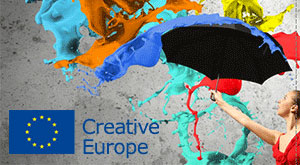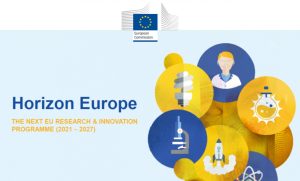CREATIVE EUROPE

Creative Europe is the main program of the European Union, which provides financial support to institutions and organizations in the field of culture in order to preserve, develop and promote European cultural and linguistic diversity, as well as heritage, and improve the competitiveness and economic potential of cultural, and especially audiovisual, activities.
It is divided into three subprograms – Culture, which covers all areas of culture and art, with the exception of audiovisual activities, which are covered by the MEDIA subprogram, and Intersectoral connection, which enables cooperation between different creative areas, covering, among other things, the area of information and media.
With a budget of 1.46 billion euros, Creative Europe supports Europe’s cultural and creative sector, providing funding for 2,500 artists and cultural professionals, 2,000 cinemas, 800 films, 4,500 book translations and a financial guarantee of up to 750 million euros for small businesses that are active in this sector. Serbia meets the requirements for financial support of the entire programme.
What does it support? Culture strand promotes cross-border cultural and creative cooperation and initiatives for the translation and promotion of literary works throughout the European Union, as well as the development of networks that enable competitiveness and international activity of the cultural and creative sectors. Platforms are also being established for the promotion of new artists and the encouragement of European programmes for cultural and artistic work. The Culture strand includes four competitions: European cooperation projects, European platforms projects; European network projects; and Literary translation projects.
The Media strand finances activities that include: the development of the European audiovisual sector, the respect and presentation of European cultural identity and heritage, the promotion of European audiovisual works inside and outside the EU, strengthening the competitiveness of audiovisual sector, facilitating access to funding and promoting the use of digital technologies. This fund finances European capitals of culture and European heritage, as well as European awards for literature, architecture, heritage protection, cinema and pop and rock music.
Who can apply? Cultural and creative organizations – small and medium-sized enterprises (between 10 and 249 employees), micro-enterprises (less than 10 employees), education and training centres, research institutions, association/trade union, international organization, non-governmental organizations, public services, start-ups, company (more than 250 employees), University, state/region/city/municipality/local government. Creative Europe is not open to individual applications. It does not support cultural investment projects.
Terms of financing check here
Serbia Desk:
Culture – Vuk Radulović
Media – Nevena Negojević; nevena@media.kreativnaevropa.rs
Creative Europe Programme 2021-2027
Commission’s proposal for Creative Europe 2021-2027 – internal note
Read more here
ERASMUS+

The Erasmus Programme celebrates 30 years. Over three decades, this flagship EU programme for education and training, youth and sport has provided 9 million people – especially young people – with opportunities to gain new experiences and broaden their horizons by going abroad. The current Erasmus+ programme, which runs from 2021 to 2027, has a budget of 26 billion euros and provides the opportunity for over 4 million people to study, train, gain work experience and volunteer abroad. Serbia has become a full member of the Erasmus+ programme since the announcement of the competition in 2019.
What does it support? Erasmus+ provides grants for activities in the fields of education, training, youth and sports. Erasmus+ also support the Eurydice network, which describes education systems in Europe and offers a comparative analysis of national systems and policies from early childhood to adult education.
Who can apply? The programme supports organizations, institutions, bodies or groups. These organizations in turn support a wide range of individuals, including: students, trainees, interns, pupils, adult learners, young people, volunteers, youth workers, teachers, professors, coaches, trainers, athletes and professionals of organizations active in relevant fields. Individuals can spend a period of mobility or volunteering abroad and receive language training, organizations that will cooperate in project partnerships in the field of academic and vocational training, schools, adult learning and European sports events. Erasmus + also supports teaching, research, networking and policy debate on EU topics.
What does the new seven-year cycle bring? In the period 2021-2027, Erasmus+ programme strives to enable the participation of an even greater number of participants and a wider range of organizations. In this regard, the new programme emphasizes inclusivity, green initiatives and digitization as key and most important priorities that it supports through a series of financial mechanisms, as well as strengthening civic values, cultural dialogue, tolerance and understanding of social, cultural and historical heritage. The general objective of the Programme is to support the educational, professional and personal development of individuals in the field of education, training, youth and sports through lifelong learning.
Terms of financing check here
Erasmus + Office in Serbia: Tempus Foundation
Tempus Foundation Info Centre – 39, Terazije Street, (1st floor) 11000 Belgrade
Tempus Office in Serbia – 27a, Ruža Jovanović Street (enter from Žabljačka Street), Belgrade, office@tempus.ac.rs
Read more here
HORIZON Europe

Horizon Europe is the EU’s framework programme for research and innovation for the period 2021-2027. It is made up of three pillars:
- “Excellent science” supports pioneering research projects defined by the researchers and initiated through the European Research Council (ERC). It funds scholarships and researcher exchanges through the activities of Marie Skłodowska-Curieand investments in the development of research infrastructure;
- “Global challenges and European industrial competitiveness” aims to directly support research related to global challenges and industrial technologies. It includes European private-public partnerships, as well as the activities of the Joint Research Centre (JRC), which contributes to the work of European and national decision-makers through independent scientific evidence and technical support;
- “Innovative Europe” aims to make Europe a leader in innovation created in new markets. It also aims to further strengthen the European Institute of Innovation and Technology(EIT) and encourage the integration of business, research, higher education and entrepreneurship.
The EU institutions reached a political agreement on Horizon Europe on December 11, 2020 and set the budget at 95.5 billion euros (including 5.4 billion euros from the NextGenerationEU Recovery Fund).
Who can apply? Universities, faculties, research institutes, education and training centres, professional associations/trade unions, state/region/city/municipality/local government, international organization, small and medium enterprises (10 – 249 employees), micro enterprises ( <10 employees), non-governmental organizations, public services, start-up companies, large companies (> 250 employees), associations, national government.
For more information visit:
Website of the European Commission
Ministry of Education, Science and Technological Development of Serbia: Horizon 2020 (previous programme)
IPARD – Support to Agriculture
As much as 580 million euros are intended for Serbian farmers in the next few years, within the IPARD III program, of which the EU provides 288 million.
IPARD “covers” all agricultural activities, so see which of these measures applies to your business, and apply for it.
- Measure 1: Investments in physical assets of agricultural holdings;
- Measure 3: Investments in physical assets related to the processing and marketing of agricultural and fishery products;
- Measure 4: Agro-ecological-climatic measures and organic production;
- Measure 5: Implementation of local rural development strategies – LEADER approach;
- Measure 6: Investments in rural public infrastructure;
- Measure 7: Diversification of agricultural holdings and business development i
You can find information about events, announcements, invitations and rules related to the implementation of the IPARD program in Serbia at the following addresses:
CUSTOMS
Customs 2021-2027 is a programme that supports the cooperation of customs authorities between EU Member States and candidate countries. The aim is to improve their efficiency by achieving better cohesion, in order to avoid damaging the Customs Union. It enables national customs administrations to create and exchange information and expertise. It allows joint developing and operating major trans-European IT systems together, as well as establishing networks by bringing together national officials from across Europe. Customs 2021-2027 has a budget of 950 million euros. The current programme covers the period 2021-2027.
What does it support? Programme supports the following measures: joint actions, seminars and workshops, project groups, expert teams, administrative capacity building in customs administrations, studies, information campaigns, IT skills development, trainings for development of necessary professional skills and knowledge in the field of customs.
Who can apply? All actions are open to officials working in customs administrations from: the EU Member States and Candidate Countries that joined the programme. Serbia started participation in CUSTOMS 2020 from 2014.
Terms of financing check here
Read more here
FISCALIS
Fiscalis 2021-2027 is a programme that deals with the exchange of information and experiences between tax authorities in European countries. The goal of the programme is to develop a pan-European information system, in partnership with other European countries, and build person-to-person networks, bringing together national officials.
The programme supports the fight against tax fraud and tax evasion, tax policy planning and the implementation of EU acquis in the field of taxation. This is achieved by exchanging information, supporting administrative cooperation and increasing the administrative capacities of the participating countries, with the aim of reducing the administrative burden of tax authorities and harmonizing costs for taxpayers.
For the period 2021-2027, the programme Fiscalis has a budget of 269 million euros. The current programme covers the period 2021-2027.
What does it support?
It supports the fight against tax fraud, tax evasion and aggressive tax planning and the implementation of the EU law in the field of taxation by ensuring exchange of information through the communication network of European information systems, bringing together officials, to help reduce the administrative burden of tax authorities and costs to taxpayers.
Who can apply?
All actions are open to officials working in tax administrations in: EU Member States and Candidate Countries that have joined the programme. Serbia joined this programme in 2015.
If you are officially interested in organizing or participating in programme activities, you should contact the European Commission: TAXUD-fiscalis@ec.europa.eu .
Terms of financing can be checked here
“Citizens, Equality, Rights and Values” Programme
The Citizens, Equality, Rights and Values Programme (CERV) was launched in 2021 and will last for seven years until 2027. It was created together with the Justice 2021-2027 within the Justice, Rights and Values Fund.
The aim of the programme is to protect and promote the rights and values contained in the EU Treaties and the Charter of Fundamental Rights, especially through support to civil society organizations that are active at the local, regional, national and transnational level.
CERV seeks to support and develop open, rights-based, democratic, equal and inclusive societies based on the rule of law. This includes a vibrant and empowered civil society, which encourages people’s democratic, civic and social participation and nurtures the rich diversity of European society, based on our shared values, history and memory.
The programme has four pillars:
- Equality, Rights and gender Equality – promoting rights, non-discrimination, equality (including gender equality), and advancing gender and non-discrimination mainstreaming;
- Citizens’ engagement and participation – promoting citizens engagement and participation in the democratic life of the Union, exchanges between citizens of different Member States and raising awareness of the common European history;
- Daphne – fight violence, including gender-based violence and violence against children;
- Union values – protect and promote Union values.
Civil society organizations active at local, regional, national and transnational level, as well as other stakeholders, can apply to receive CERV funding for initiatives aimed at citizens’ engagement, equality for all and the protection and promotion of rights and EU values.
Contact: Sanja Atanasković Opačić, e-mail: sanja.atanaskovic@minljmpdd.gov.rs
EU Civil Protection Mechanism
The aim of EU activities in the field of civil protection is to support efforts to prevent disasters and ensure the readiness of civil protection units to act in the event of disasters – at the national, regional and local level. When the scale of a state of emergency exceeds a country’s response capabilities, it can request assistance through the Mechanism. Through the Mechanism, the European Commission plays a key role in coordinating disaster responses in Europe and beyond and contributes at least 75% of the transport and other operational costs of the deployment.
Since its establishment in 2011, the Civil Protection Mechanism has responded to over 330 requests for assistance within and outside the EU. Combining civil protection capacities enables a stronger and more coherent collective response. In addition to the EU member states, there are currently 6 member states of the mechanism (Iceland, Norway, Serbia, North Macedonia, Montenegro and Turkey). In 2015, Serbia became the 33rd country participating in the Mechanism.
In 2019, the EU strengthened all components of disaster risk management in order to better protect citizens from disasters. The upgraded Mechanism established a new European reserve of additional capacity (“rescEU reserve”) that includes firefighting aircrafts and helicopters, medical evacuation capacity and a medical team trained to set up a field hospital.
What does it support? The Civil Protection Mechanism offers numerous opportunities for cooperation with Serbia, such as: use of European monitoring tools and early warning systems, participation in joint trainings and exercises, exchange of experts, participation in disaster prevention projects, direct communication with other civil protection bodies involved in response to emergency situations, exchange of information and best practices, coordinated EU mitigation operations, co-financing of team transport and other assistance.
Who can apply? Any country in the world, as well as the United Nations and its agencies or a relevant international organization, can call on the EU Civil Protection Mechanism for help.
Read more about EU civil protection projects here, in case of floods in Serbia here and migration crisis here.
IPA CARE 2023-2029
The EU funded IPA CARE Programme supports the capacity of the Western Balkans and Türkiye in preventing and mitigating the risks and consequences caused by earthquakes and health crises.
Strong and coherent legal frameworks and procedures are key in disaster risk management. It is also the foundation for optimal inter-institutional coordination making collective action move from idea to reality in disaster risk management locally, regionally as well as across borders.
Preparedness and operational capacity to provide and receive support within the Union Civil Protection Mechanism (UCPM) contributes to a safer living in the Western Balkans and Türkiye as well as in the EU.
More details on this link: https://www.euzatebe.rs/en/projects/ipa-care-2023-2029
The European Social Fund Plus (ESF+)
The European Social Fund Plus (ESF+) is the European Union’s main instrument for investing in people and supporting the implementation of the European Pillar of Social Rights. With a budget of almost €99.3 billion for the period 2021-2027, the ESF+ will continue to make an important contribution to the EU’s employment, social, education, and skills policies, including structural reforms in these areas.
Employment and Social Innovation (EaSI), as part of the European Social Fund Plus (ESF+), has a budget of €762 million. The EaSI strand builds on the previous EaSI programme (2014-2020), maintaining a focus on evidence-based policy-making and social experimentation, job mobility support, and non-financial instrument activities, with an emphasis on microfinance and social entrepreneurship.
EaSI is focused on the following main priorities:
- Employment and skills
- Labour markets and labour mobility
- Social protection and active inclusion
- Working conditions
More details can be found at the following link: https://european-social-fund-plus.ec.europa.eu/en/esf-direct-easi
